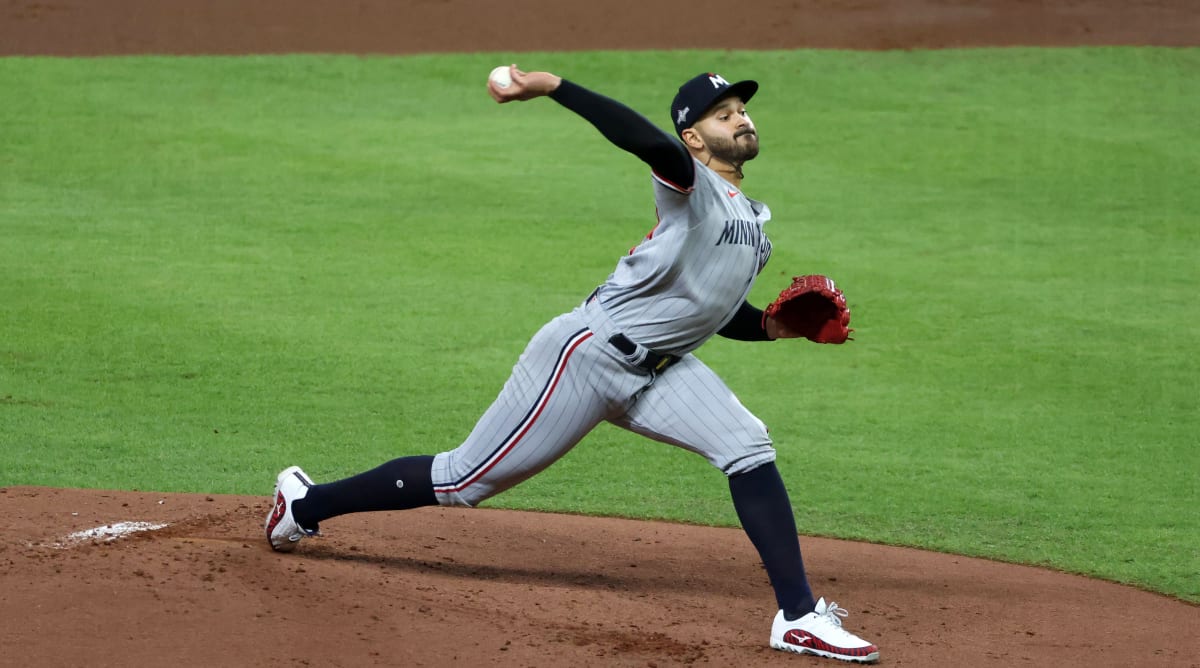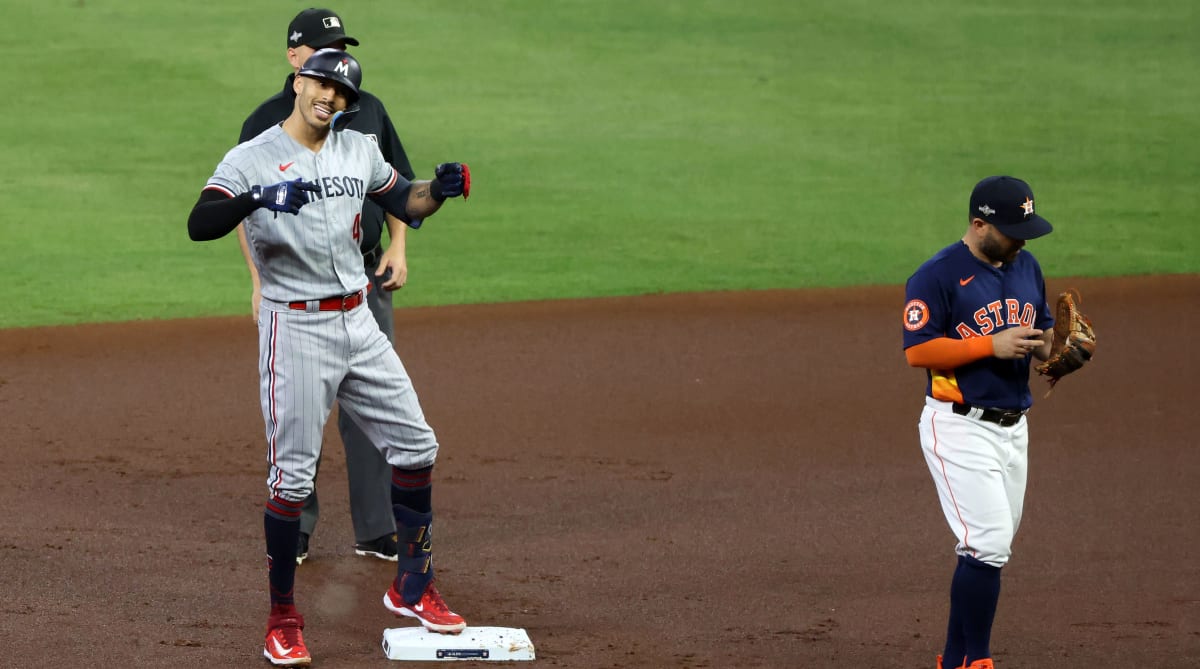No metric, no pay stub, no agent, no arbitration hearing, no award, no algorithm defines the value of a ballplayer as honestly as October, when baseball becomes its transparent best. The cruelty of small sample size collides with the weight of meaning.
To understand this crucible is to understand what happened in the Twins clubhouse as they prepared to play Game 2 of the American League Division Series against the Astros. In what was a veritable must-win game for Minnesota, Carlos Correa, he of the .230 batting average and 1.4 WAR in what was the worst regular season of his career, ran the hitters’ meeting as the Twins prepared for Houston starter Framber Valdez.
Having played seven seasons for Houston, Correa seemed the rightful one to chair the meeting. But in fact, this was nothing new. Minnesota’s analytics department will cook up its stew of numbers and trends, but the information is distilled and presented by coaches and players like Correa, not analysts.
“We are going to get him out over the plate,” Correa told his teammates. “So, we’re going to give him away. Don’t look for the ball away because that’s where he wants to get you out. Get him up and get him out over the plate.”
It was just the beginning of another October night that proved Correa’s value. The Twins jumped Valdez for five runs, the first coming when Correa ripped a curveball up and over the plate for a run-scoring double and the last two coming on Correa’s two-run single on a sinker over the middle of the plate. Correa had three hits and three RBI in a 6–2 win that ended with a scriptwriter’s touch: Correa sprawling to the ground at shortstop to field a hot smash and then throwing a dart to first base.
“He’s Iron Man,” Twins infielder Kyle Farmer says. “He puts that playoff mask on and he becomes a different player. He’s awesome to watch. I looked at his postseason numbers and they are ridiculous. I mean, he’s got numbers in the postseason that would be great numbers in a regular season.”
In 83 postseason games, Correa has 18 homers, 63 RBI and an .872 OPS, well above his .819 OPS in the regular season. He passed Derek Jeter and David Ortiz on the postseason RBI list. “Wow. Two guys I grew up watching,” he says. Only Bernie Williams (80) and Manny Ramirez (78) have more postseason RBI than Correa.
After five straight series this year began (and often ended) at 2–0, we have a series locked at one game apiece with the juicy possibility of a staring contest between Justin Verlander and Pablo López in Game 5 on Friday at Minute Maid Park. Neither ace has blinked yet. López followed Verlander’s six shutout innings in Game 1 with seven shutout innings in Game 2. He joined his boyhood role model and fellow countryman Johan Santana (2004 ALDS) and Jack Morris (1991 World Series) as the only Minnesota pitchers to throw seven or more shutout innings in a postseason game.
Since the Astros’ run began in 2017, Houston has played 41 postseason games at Minute Maid Park. No visiting pitcher had ever thrown seven shutout innings in those 41 games. Until López did it. He was that good, threading his five pitches through and out of the strike zone like a master tailor with needle and thread. Everything about López is highly intentional—the way he trains, the way he thinks, the way he prepares, the way he eats, the way he talks and especially the way he chooses what to throw and where to throw it.
“Pablo is just a great human,” Twins manager Rocco Baldelli says. “If he were not a baseball player, he would be a great surgeon or a great lawyer or great at whatever else he chose to be. I am fully confident of that.”

Thomas Shea/USA TODAY Sports
Correa more fits the mold of a baseball rat, the compliment reserved for those who eat, sleep and breath the game. It is their passion. Their nutrition.
“This time of year, you can see it,” Farmer says. “There’s a different energy about him, a different kind of locked-in-ness to everything he does. It’s fun to play with someone like him because the guy knows what it takes to win. He makes everyone else better.”
I asked Farmer if he played with anyone else like Correa.
“Justin Turner,” Farmer says. “Justin taught me so much when we played together with the Dodgers. The attention to detail, the baseball I.Q. I would watch Justin when he walked into the on-deck circle. You could almost see him in those next two or three minutes just prepare himself intensely. It’s like he became a different person. Carlos is like Justin.”
If you love the game of baseball, you must love the baseball intellect Correa has brought to his four games in October already. It’s the baseball version of Arabica beans with a French press to a coffee connoisseur.
There was the spectacular sidearm dart he threw to home plate on the run to throw out Bo Bichette of Toronto. (Though in fairness, Correa first had been napping on the play, failing to back up third baseman Jorge Polanco.)
There was the trickery he choreographed to pick off Jays runner Vlad Guerrero Jr. at second base to bail pitcher Sonny Gray out of a second-and-third jam. Correa had alerted Gray in the first inning that Target Field was so loud that a runner on second would not be able to hear the warnings of a third base coach, which would provide great cover to run a back pick timing play with the use of Pitchcom. (Unlike reports that Gray signaled Correa or that a Twins coach in the dugout alerted Gray, Correa gave the go-ahead signal and catcher Ryan Jeffers, Gray and Correa were all in on the ploy through a button Jeffers pressed on Pitchcom.)
There was the sweet deke he pulled in ALDS Game 1 on veteran Astros first baseman Jose Abreu, who thought he had an easy advance from first as a pitch bounced away from Jeffers. Correa sold Abreu on such false safety by putting his hand up in an “all-clear” signal and not raising his glove until the last moment to catch a seed of a throw from Jeffers. Like sticking the landing on a triple Lutz, Correa even completed the play with a no-look tag.
There was his Iron Man game Sunday night, in which the masked avenger spoiled Houston’s night by running the pregame planning against Valdez, stroking three hits and playing spectacular defense.
Houston manager Dusty Baker accommodated Correa’s production by letting him face Valdez a third time. Laboring, leaving more pitches up, Valdez was at the end of his rope when Correa came to bat with the bases loaded in the fifth and one out in what was still a competitive game, 3–0. Baker had righthander Phil Maton warming in the bullpen.
“Honestly, I thought they were going to bring in Maton,” Correa says.
They didn’t.
“We were expecting to see a lot more of his curveball tonight,” Farmer says of Valdez. “He really never threw it that much. Yeah, that was surprising.”
It was as if Correa had taken that curveball away from him with that ringing double in the first inning.
Baker was in a difficult spot. By letting Valdez stay in the game, he was betting the ballgame on Valdez getting a double-play grounder. After all, no left-hander in baseball threw more double-play grounders this year than Valdez. Maton is a flyball pitcher.
Baker was counting on one pitch to get him out of the jam. But even Valdez gets a double play only 15% of the time when it’s in order. The greatest risk was letting Correa see a fatiguing Valdez a third time, of giving a clutch hitter another chance to come through against a lefty.

Thomas Shea/USA TODAY Sports
“When it matters most,” Baldelli says, “it's like he can really take his attention and channel it and focus it and just play even better over and over again. It's not by chance. It's definitely not the lottery here. He keeps hitting right at the right time.”
Baldelli had moved Correa from sixth in his batting order in Game 1 to fourth in Game 2, as high as he had hit Correa since the middle of September. The thinking had nothing to do with metrics or matchups.
“It’s October,” Baldelli says.
The calendar alone was enough of a reason. He didn’t even bother running it by Correa. He simply posted the lineup.
“This is a lifetime of work in the making when you see him step on the field to do these things,” Baldelli says. “We're not surprised. We took the guy, hit him right in the middle of the lineup today for a reason because we believe that he's going to go out there and do things like that. And to keep doing it, it's hard to do, but he keeps doing it.”
Correa still makes Houston his home. He hits in the offseason off Houston bullpen catcher Javier Bracamonte. His brother, J.C., is a catcher in the Astros’ system who joins them. He remains close with Astros second baseman José Altuve.
“We talk and text all the time during the season,” Altuve says. “The last time we texted was right before the season ended. This week, no, we are not going to text. I think we will wait until after the series.”
For six Octobers, Altuve and the Astros benefited from Correa’s knack of coming through in the clutch—“My time,” as he almost operatically defined his knack by pointing to an imagined watch on his wrist upon a home run in the 2021 ALCS. Now the Astros are on the other end. They cannot sit back and enjoy the show. They must find a way to stop the Iron Man of October.







